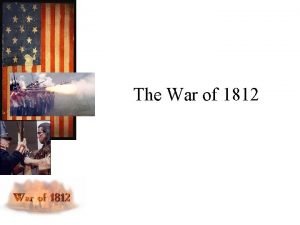You Decide The War of 1812 The decision


- Slides: 2

You Decide – The War of 1812 The decision to send a nation to war is never easy. In the case of the War of 1812 it was so contentious that some states threatened to leave the union entirely if they did not get their way. Ultimately it resulted in the narrowest war vote in US history. Today you will hear from witnesses and examine evidence to help you make up your own mind. Should the nation have gone to war against Britain in 1812? Let’s find out. Part 1: Witness Interviews Fill in the following chart as you watch the interviews Josette Dugas- New Orleans Resident John Bradford- Boston Shipping Merchant Pro-war Anti-War Rationale: James Madison- U. S. President George Roberts- U. S. Navy Sailor Pro-war Anti-War Rationale: Henry Clay- Kentucky Congressman John Randolph- Virginia Senator Pro-war Anti-War Rationale: Margaret Elliot- Frontier Resident Francis Scott Key - Maryland Lawyer Pro-war Rationale: Anti-War Pro-war Anti-War Rationale: Anti-War

Part 2: Selections from Madison’s Speech to Congress Read the following passage and answer the questions below. “The conduct of Britain’s Government presents a series of acts, hostile to the United States as an independent and neutral nation. 1. British cruisers have been in the continued practice of violating the American flag on the great high-way of nations, and of seizing and carrying off persons sailing under it. 2. British cruisers have been in the practice also of violating the rights and the peace of our coasts. They hover and harass our entering and departing commerce and have wantonly spilt American blood within the sanctuary of our territorial jurisdiction. 3. Our attention is also drawn to the warfare, just renewed by the natives; a warfare which is known to spare neither age nor sex, and to be distinguished by features peculiarly shocking to humanity. It is difficult to account for the activity of those natives that have been in constant contact with British traders and military, without connecting their hostility with that British influence. ” 3. Put the three complaints above into short, simple language. 1) 2) 3) 4. If you heard just this part of Madison’s speech and none of the other information from this lab would you be convinced that the U. S. should go to war with Britain? Explain. 5. Consider all three parts of this lab and complete the ARE stems below answering: Should the U. S. have declared war on Britain in 1812? A: Britain should / should not have declared war on Britain in 1812. R: This is the case because E: This is proven by ____________________________ which shows____________________________________________________________________________________________. Additionally it is proven by _________________________ which shows ___________________________________________________________.



